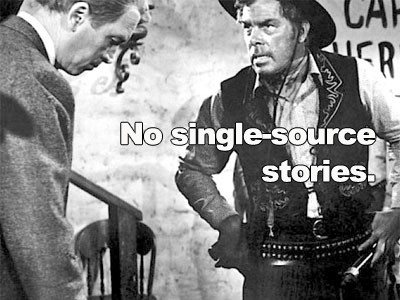
I was always Iron Man. I wasn’t the smartest person in journalism and I sure didn’t have the elite degrees, but I could outwork anyone. The reality is that while I am still fast and effective (I hope), my iron is facing its limits. Between my print Seattle Times columns, daily online columns for the Times, a regular gig on local public radio, writing Rogue Columnist for my Phoenix readers, and a novel deadline bearing down on me … well, its time to bow out here.
It has been a great honor to be part of the Bizjournalism stable of writers. On leaving, let me highlight some of my favorite pointers:
1. Business journalism at local news organizations should produce the most compelling local news — more than the school board, city council or even the Otay Water District.
2. Decide on some touchstones that are big, consequential and/or sexy and beloved — and cover the hell out of them.
3. Avoid rookie mistakes that not only will embarrass you, but also keep your stuff from being read. No single-source stories. Do add context. Get the numbers right. Learn good news judgment. And also discover how to get scoops.
4. Don’t be envious of the space and budget lavished on the sports section, learn from the sporties.
5. Curiosity and skepticism are essential skills for our calling. Don’t be a tool. An adversarial relationship — it can be handled perfectly cordial — is healthy.
6. Master the art of the interview. Don’t be dazzled or intimidated by star CEOs. One of the greatest skills a reporter can gain is that people want to talk to you. One of the greatest perqs of our job is that we get to ask questions.
7. Covering the economy shouldn’t be boring. It should be one of the hottest beats in the newsroom, or virtual newsroom.
8. You’ll cover different beats. Learn how to get up to speed fast.
9. Even with all our gadgets, good writing still matters. It invites the reader in and she wants to stay, see what you have to say. It aims for clarity in an age of jargon and obfuscation.
Write with authority so that even experts learn something new. Write with elegance and skill so that even people with no interest in the topic will be drawn in. And don’t forget the importance of a great lede.
10. I’m a believer in most coverage being driven by (well directed) reporters, rather than a bunch of editors sitting around a table. If you don’t want that dull, top-down assignment, own your beat and more to originate compelling content.
11. Get to know your friend, FRED, the wonderful site at the St. Louis Fed. It’s the go-to place for chartable data, but it also offers data that will inspire and deepen your coverage.
12. When you parachute in for a story in unfamiliar places, be sure to follow these basic tips.
Starting this gig, I said I didn’t have all the answers — nowhere near. I leave the same way, still learning, still open to new information. As Keynes said to a man demanding to know why the great economist had altered his position on an issue, “When the facts change, I change my mind. What do you do, sir?”
I know a few things. Our calling is important — what we do matters — for our democracy and civilization. With power so highly concentrated in the big business elite today, this is the most important coverage area, demanding smart, tough, diligent journalists. Not everything that’s new is true or helpful. Not everything that’s “old” is useless or mere sentimentality.
Thanks for reading and do continue to check all the valuable stuff on the Reynolds site. I love to be a resource for journalists — as time allows. You may reach me at jtalton@seattletimes.com or jontalton@yahoo.com.










